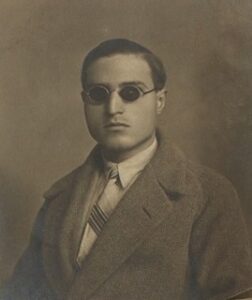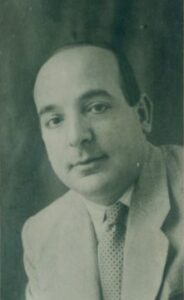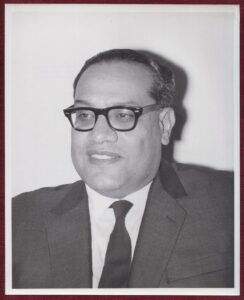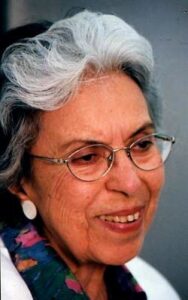At Edinburgh, the Middle East was more than an area of study; it was also home to an increasing number of international students. From at least the 1840s, students from Turkey, Persia and Egypt begin to appear in the University matriculation lists, registering for a range of programmes. Their presence contributed to a record of academic achievement as well as social and often political involvement on campus during the time of their studies. This often served as the foundation for productive and sometimes distinguished lives after graduation, in academia, politics and public life.

Subhi Dajani
A pioneering Palestinian blind educator who made a lasting contribution to the education of the visually impaired across the Arab world, Subhi Dajani was born in Jerusalem from a prominent family but lost his sight to meningitis at the age of four. In 1929 he became the first blind student accepted at the American University of Beirut and, after graduation, came to Edinburgh where he earned a Teaching Certificate from the Edinburgh Provincial Training Centre (now Moray House) in 1934. In 1938, he founded al-‘Ala’iyya in Hebron, the first school for the blind in the Arab world, which welcomed students from Palestine, Lebanon, Syria, Jordan, Egypt, and the Gulf and included a library and printing house that would produce the first braille copy of the Quran. In 1951, he represented Palestine at the UNESCO conference in Paris and later helped establish centres for the blind in Iraq (1954) and Kuwait (1955).
 Abd El Razzak Sidky [‘Abd al-Razzaq Sidqi]
Abd El Razzak Sidky [‘Abd al-Razzaq Sidqi]
A prominent Egyptian agricultural scientist and educator, ‘Abd al-Razzaq Sidqi graduated in agriculture at the Egyptian (now Cairo) University in 1933. In 1939 he was awarded a PhD in Science from the University of Edinburgh, with a dissertation titled, ‘The Frequencies of double and multiple Break Translocations in Relation to Radiation dose, and other genetical studies’. He served as Egyptian Minister of Agriculture (1952-57) during which time he established a specialised agency for agricultural guidance and worked on the maintenance of the quality of Egyptian cotton. His international roles included serving for 14 years as Assistant Director-General of the Food and Agriculture Organization (FAO) of the United Nations for the Middle East and also as Technical Advisor to the Director-General of UNESCO from 1970. Elected to Egypt’s Higher Advisory Committee of the Academy of Scientific Research, he also served as Chairman of the National Nutrition Committee, where he contributed significantly to agricultural and scientific policy.
 Ibrahim Helmi Abdel-Rahman
Ibrahim Helmi Abdel-Rahman
An economist and scientist, Ibrahim Hilmi ‘Abd al-Rahman played a pivotal role in shaping Egypt’s economic development under the Republican regime, significantly influencing Egypt’s modernisation policy. One of the first students to graduate with honours in the Astronomy Department at Cairo University in 1938, he went on to earn his PhD in Science from the University of Edinburgh in 1941, with a dissertation titled ‘A Study of Stars of Early Spectral Type, with Special Reference to Emission-line Spectra’. ‘Abd al-Rahman pursued postdoctoral research in astronomy at Cambridge University in 1942 before returning to Cairo University, where he taught and later became assistant professor. A founding father of planning science in Egypt and the Arab world, he served as first director of the Egyptian Ministry of National Planning, and ultimately as Minister of National Planning under Sadat (1975-76). He also served as the first executive head of the United Nations Industrial Development Organization (UNIDO) from 1966 to 1974.
 Samha Alkholy [al-Khuli]
Samha Alkholy [al-Khuli]
One of the first Egyptians to study music abroad, Samha El-Kholy earned her PhD from the University of Edinburgh in 1954. Her dissertation, ‘The Function of Music in Islamic Culture (up to 1100 AD)’ contributed significantly to early scholarship on music in Islamic societies. A founding member of the Cairo Conservatoire — she was the first woman in Egypt to be appointed its dean in 1972 and during her tenure oversaw the formation of the first all-Egyptian orchestra in 1975. She later served as President of the Academy of the Arts University (1982–1985), sat on the board of the International Society for Music Education (ISME) and was a visiting Fulbright scholar at the University of South Florida (1987–88). She authored several works, including Nationalism in Twentieth-Century Music (in Arabic). Beyond her academic work, she supported contemporary Egyptian composers, helped to establish the Blind Girls’ Orchestra, and hosted the long-running television programme Sound of Music. El-Kholy continued teaching as professor emerita until her death.